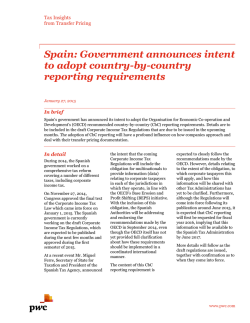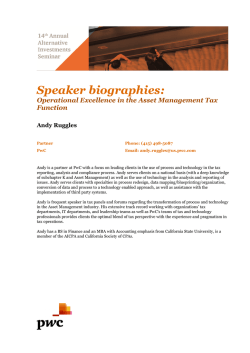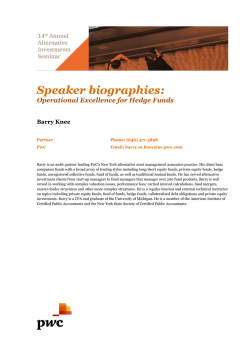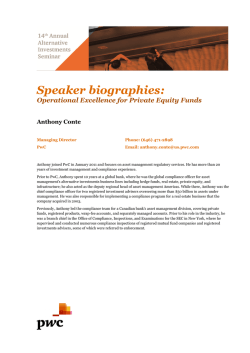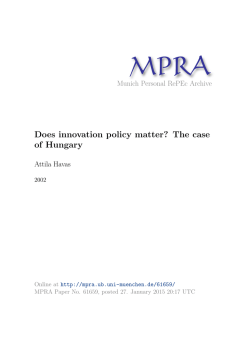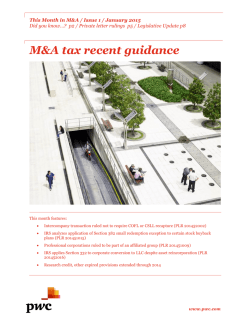
7519 Compare & Share_What we know_infographic_2
What we know about the Global Sharing Economy A Report by Benita Matofska Founder, Compare and Share March 2015 www.compareandshare.com What we know about the Global Sharing Economy Introduction In January 2014, I embarked on a mission to gather all the global data on the Sharing Economy in order to understand the scale, growth and potential of this worldwide phenomenon. As an early expert in this space, I knew that the Sharing Economy represented a significant, global, societal shift; what I didn’t know was that the Sharing Economy is growing faster than Facebook, Google and Yahoo combined. This new market is valued at $15 billion in its first 7 years, compared to the combined growth of Facebook, Google and Yahoo of $11 billion over a comparable period. But what makes it significantly more valuable, is that it not only provides an exceptional investment opportunity and a significant contribution to the global economy in monetary terms, but it puts the environment and sustainability at the heart of the way in which it operates. The creation of this social and environmental capital means that the Sharing Economy has the potential to become a true sustainable economic system. What we know about the Global Sharing Economy is the first comprehensive overview of data on the Sharing Economy from around the world. It is also the first piece of living research. As new studies are carried out, we will add to and update this data, so that this remains to be the most comprehensive source of evidence on this new economic system built around the sharing of human and physical resources. Methodology Our approach was simple, given that each study has been carried out by different organisations, taking different approaches, we have not attempted to compare or amalgamate studies. Instead, we have grouped the findings into subject areas e.g. participation; valuation; barriers etc. and put them into accessible infographics. It is in summation that they give us a true picture of what is happening on a global scale. What’s clear from the data is that there is still much research to be done on the Sharing Economy. In particular, more work needs to be carried out to achieve a comprehensive valuation that quantifies and measures the total economic contribution and also calculates the social and environmental value. It is only then that we will know the true value of the Sharing Economy. This report would not have been possible without the hard work of researcher Elena Denaro who I had the pleasure of working with for a year. I would like to publicly thank Elena for What we know about the Global Sharing Economy her valuable contribution to What we know about the Global Sharing Economy. This living research is intended to be widely shared. If you have new studies on the Sharing Economy that you’d like to add please email: [email protected] or if you find errors or omissions do let us know also so that we can make this as accurate, comprehensive and up-to-date as possible. number of people and organisations to develop this. I believe, Sharetrade will help to de-risk the Sharing Economy, hugely increasing investment and participation rates, which in turn will make a significant contribution to the future global economy. A People’s Economy The data on participation rates speaks for itself. The Sharing Economy has been driven from the bottom up. We know that more people want to engage and that the biggest barrier is trust - people need to feel safe and secure. In order to address this issue and to propel further global growth of the Sharing Economy, I have led the development of a trust kitemark called Sharetrade that will enable consumers to engage in sharing activities safely and securely. I first wrote about Sharetrade in January 2011 and have since worked with a Benita Matofska Chief Sharer & Founder, Compare and Share March 2015 Valuation of the Sharing Economy The Sharing Economy is valued at $15Billion globally. Estimated to rise to $335Billion There are $3.5 Trillion by 2025 of idle resources - (PwC, 2014) (ThePeople Who Share, 2014) Sharing within the workplace brings significant economic returns $46 Billion The circular economy has been estimated $$$ to $1Trillion p.a. by 2025 in Australia in 2014 (Ellen MacArthur Foundation, 2014) (Deloitte, 2014) $10 Billion of value Company Valuations in the Sharing Economy: Airbnb £20 billion, 2015 Uber $40 billion, 2015 UK consumers earned $4.6 Billion in 2013 (The People Who Share) www.compareandshare.com to provide material costs savings of up #sharingeconomy created from idle capacity in the car industry alone (Arun Sundararajan, NYU Stern 2015) Participation 28% of adults globally are members of sharing services Highest participation rates in Asia-Pacific with 78% willing to share their own goods and 81% willing to rent from others (Havas Worldwide, 2014) (Nielsen, 2014) 46% of people globally prefer to 68% of adults globally are willing (Havas Worldwide, 2014) (Nielsen, 2014) share goods rather than own them 64% adults participating in sharing activities in the UK (Nesta, 2014) Participation rates in sharing services could double in the next year (Crowd Companies, 2014) to share or rent goods for money 80 Million (Crowd Companies, 2014) 53% have participated in sharing activities in Australia (Vision Critical, 2014) www.compareandshare.com #sharingeconomy sharers in the US There are over 7,500 sharing platforms globally. compareandshare.com Global Sharing Economy Directory has $28 Million a day is invested in Sharing Economy startups (Crowd Companies 2014) 7,553 listings. Startups and Investment 37% of Sharing Economy startups are VC funded 80% of Sharing Economy startups see crowdfunding as the best way to raise capital (Crowd Companies 2014) (Compare and Share, January 2015) www.compareandshare.com #sharingeconomy Motivation and drivers 1. Saving & making money (Vision Critical & Collaborative Lab, PwC, 2014) 2. Sustainability and the collective good (Leo Burnett, 2014, Havas Worldwide, 2014) 50% 65% 3. Technology (Zipcar, 2013, Lattitude & Shareable, 2010) 4. Changing values & shift towards community and away from hyper-consumption 5. Convenience (Vision Critical & Collaborative Lab, Crowd Companies, PwC, 2014) (Vision Critical & Collaborative Lab, 2014, Havas Worldwide, 2014, IPSOS, 2013; Heinrichs & Grunenberg, 2013, Leo Burnett, 2014) 65% 7. Desire not to own 6. Better value (Vision Critical & Collaborative Lab, 2014) (Vision Critical & Crowd Companies, 2014, PwC, 2014) 8. Trying out new services and couldn’t find elsewhere (Vision Critical & Crowd Companies, 2014) 9. Recommended by others (Vision Critical & Crowd Companies, 2014) www.compareandshare.com #sharingeconomy 10. Helps the needy (Leo Burnett, 2014) 33% of Millennials used Sharing services to save money Demographics Generation Share Millennials 34% of the population 17.5 million Millennials in the UK, 2.68 billion globally Millennials are (The People Who Share, 2014) 51% of Millennials prefer to share rather than own (Havas Worldwide, 2014) (JWT Intelligence, 2013) 25-34 year-olds are driving the Sharing Economy (Havas Worldwide, 2014) A middle-class phenomenon, popular amongst higher income groups $100,000 in the US and over $60,000 in the UK earning over (Crowd Companies, 2014) Millennials are most likely to participate (Nielsen, 2014) 50% of Millennials try products that support good causes (JWT Intelligence, 2013) 73% say the Sharing Economy is important to them (American Planning Association, 2014) Generation Share is a term coined by Benita Matofska, global Sharing Economy expert and CEO of Compare and Share and refers to the Millennials who are driving the Sharing Economy, choosing to access rather than own goods and participate in sharing activities. 57% say they can find anything they need to rent or borrow online People in full or part-time employment, in managerial and professional work are most likely to engage in sharing (Nesta, 2014) (Havas Worldwide, 2014) 40% of Millennials used Sharing services to earn income or learn new skill www.compareandshare.com #sharingeconomy www.compareandshare.com (JWT Intelligence, 2013) #sharingeconomy Low Income communities twice as likely to give ownership up (Arun Sundararajan, NYU Stern 2015) Who benefits ? Sharing Economy has 3x greater impact for low income communities (Arun Sundararajan, NYU Stern 2015) www.compareandshare.com #sharingeconomy Barriers 1. Trust Issues (Vision Critical & Collaborative Lab 2014, Nesta, 2014, PwC 2014) 2. Ease of sharing (Cooperatives UK) 3. Don’t know any users,social proof (Vision Critical & Collaborative Lab) 4. Time it takes to learn new platforms (Nesta 2014) 5. Insufficient knowledge of how to get started (Vision Critical & Crowd Collaborative Lab, 2014) 6. Concerns about scams or fraud, privacy & safety risks (Vision Critical & Collaborative Lab and Nesta 2014) www.compareandshare.com #sharingeconomy What is being shared ? Global Skills Australia 26% (Nielsen 2014) Sports Equipment Car sharing 34% 41.5% House swapping 22% (Havas Worldwide 2014, PwC 2014) Pre-loved goods 34% P2P goods rental Car sharing 36% Pre loved goods 51% (The State of the Sharing Economy, Opinium Research for The People Who Share, 2013) (Vision Critical & Crowd Companies, 2014) (Vision Critical & Collaborative Lab, 2014) Electronics 28% (Nielsen 2014, Havas Worldwide 2014) www.compareandshare.com U.K. #sharingeconomy Media 10% (Nesta 2014) Appliances 48.5% (Havas Worldwide 2014) Future predictions The circular economy, a subset of the Sharing Economy, has been estimated to provide material costs savings of up to $1Trillion p.a. by 2025 (Ellen MacArthur Foundation, 2014) 91% By 2025, the total value of 5 sectors of the Sharing Economy is estimated to rise to $335 Billion globally (PwC, 2014) 40% say they will attempt new types of sharing (Havas, 2014) www.compareandshare.com 50% of Millennials intend to engage in more sharing in the coming 12 months (Havas, 2014) #sharingeconomy 60% of adults in the UK say they’ll swap goods in the future (The State of the Sharing Economy, Opinium Research for The Peo ple Who Share, 2013) of adults show an appetite for continued sharing in the future (Vision Critical & Crowd Companies, 2014) 91% of sharers say they will recommend the sharing services they partake in via social media (Vision Critical & Crowd Companies, 2014) Taxonomy of the Sharing Economy 17 sectors of the Sharing Economy have been identified: 1. Transport 10. Knowledge & Learning 2. Property & Spaces 11. Health & Fitness 3. Tasks, Job & Skills 12. Eco 4. Finance 13. Pets 5. Goods 14. Securities & Trust 6. Utilities 15. Communities & Networks 7. Leisure & Entertainment 16. Public governance & Services 8. Food & Drinks 17. Logistics 9. Creativity & Media www.compareandshare.com #sharingeconomy If you have new studies on the Sharing Economy that you’d like to add please email: [email protected] or if you find errors or omissions do let us know also so that we can make this as accurate, comprehensive and up-to-date as possible. www.compareandshare.com
© Copyright 2026


